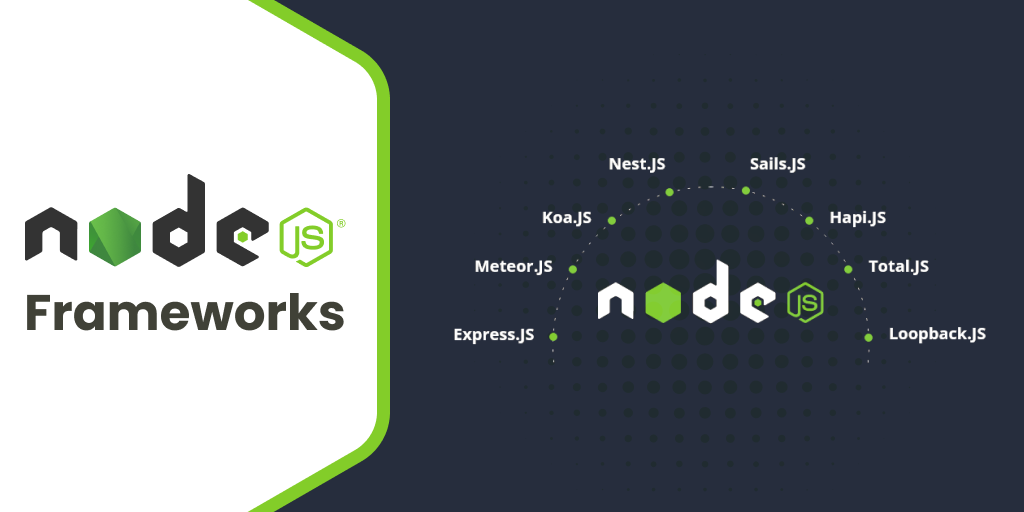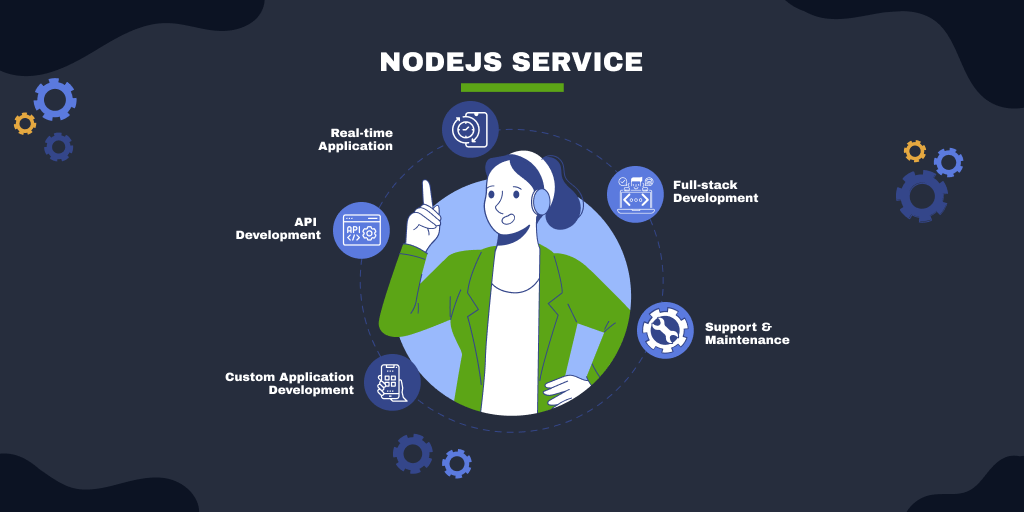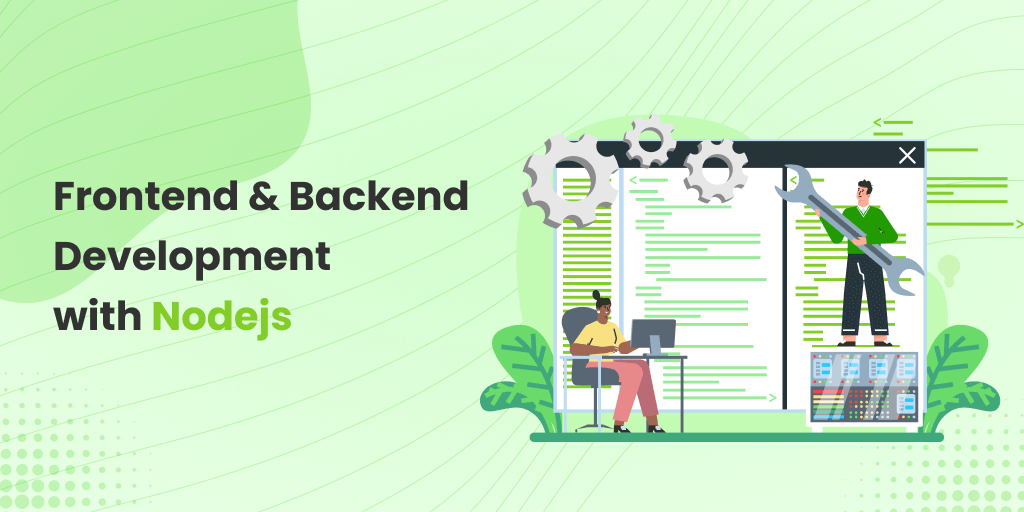Blog Details
- home
- Blog Details

Why Use Node.js for Building Web Applications?
- Admin
- June 20, 2023
Node.js is designed to handle asynchronous programming, which means that it can handle multiple requests at the same time without waiting for each one to finish before moving on to the next. This makes it ideal for building real-time applications like chat apps, online games, and streaming services. The V8 engine, which is the same engine that powers Google Chrome, to execute JavaScript code. This results in fast and efficient code execution, making Node.js ideal for building high-performance web applications. JavaScript is one of the most popular programming languages, and most developers are already familiar with it. This means that developers can quickly get up to speed with Node.js and start building web applications.
What is Node.Js?
Node.js is a popular open-source, cross-platform, server-side runtime environment built on Chrome's V8 JavaScript engine. It allows developers to build scalable and high-performance applications with JavaScript on the server-side.
Node.js uses an event-driven, non-blocking I/O model, which makes it lightweight and efficient. This means that Node.js can handle a large number of concurrent connections with low overhead, making it ideal for building real-time web applications, APIs, and other network-based services.
Node.js comes with a set of built-in modules that provide a wide range of functionality, such as file system access, networking, and cryptography. It also has a powerful package manager called npm, which provides access to a large number of third-party modules that can be easily installed and used in Node.js applications.
Node.js is widely used in web development, and it has become a popular choice for building web applications, both on the server-side and the client-side, as well as for building command-line tools and utilities.
Node.Js Framework

Node.js is a runtime environment for executing JavaScript code outside of a web browser, allowing developers to build scalable and high-performance applications. There are many Node.js frameworks available that provide additional tools and libraries to streamline the development process. Here are some popular Node.js frameworks:
- Express: Express is one of the most popular Node.js frameworks for building web applications. It offers a robust set of features for routing, handling HTTP requests and responses, and integrating with various template engines and databases. Express is flexible and minimalistic, making it a good choice for both small and large web applications.
- Meteor: Meteor is a full-stack JavaScript platform for building real-time web and mobile applications. It provides a range of built-in features, such as data synchronization and reactive UI, making it easier to build complex applications with less code. Meteor is a good choice for developers who want to build real-time applications that require features such as real-time updates and chat functionality.
- NestJS: NestJS is a modern Node.js framework for building scalable and maintainable server-side applications. It uses TypeScript, which adds optional static typing and other features to JavaScript, making it easier to write clean and readable code. NestJS is a good choice for developers who want to build complex web applications that require features such as authentication, caching, and validation.
- Hapi: Hapi is a powerful and configurable Node.js framework that provides a comprehensive set of tools for building web and API applications. It has a plugin-based architecture that makes it easy to add new features and functionality.
- Sails.js: Sails.js is a real-time MVC (Model-View-Controller) Node.js framework that is built on top of Express. It offers a range of features, such as automatic route generation, WebSocket support, and ORM (Object-Relational Mapping) integration. Sails.js is a good choice for developers who want to build real-time applications such as chat apps, multiplayer games, or collaborative tools.
- Koa: Koa is a lightweight and expressive Node.js framework that builds on top of Express. It offers a simpler and more elegant API and is designed to be more modular and extensible. Koa is a good choice for developers who want a lightweight framework that allows them to write code that is easy to read and maintain.
These are just a few of the many Node.js frameworks available for building web applications. The choice of framework ultimately depends on the specific needs of your project, your personal preferences, and the experience level of your development team.
Node.js Web Application Development Services

Node.js is a popular and powerful platform for building scalable, real-time web applications. If you're looking for Node.js web application development services, there are a number of options available.
Here are some common services that Node.js web application development companies might offer:
- Custom application development: Companies can develop custom web applications using Node.js based on your unique requirements.
- API development: Node.js is well-suited for developing APIs, so companies may offer API development services using Node.js.
- Real-time application development: Node.js is ideal for developing real-time applications such as chat applications, collaboration tools, and streaming platforms.
- Full-stack development: Node.js can be used for both front-end and back-end development, so companies may offer full-stack development services using Node.js.
- Support and maintenance: Companies can provide ongoing support and maintenance services for Node.js web applications to ensure they continue to function smoothly and efficiently.
When searching for Node.js developers online, it's important to thoroughly review their portfolio, experience, and past client feedback before hiring them. You can also ask for references or speak with past clients directly to get a better idea of their work quality and reliability.
Additionally, you may want to consider attending industry conferences, meetups, or online forums related to Node.js development. These can be great places to connect with experienced developers and learn more about the latest trends and best practices in the field.
Ultimately, the key to finding the right Node.js web application development service is to do your research, ask questions, and carefully evaluate your options to find a provider that can meet your specific needs and deliver the results you're looking for.
When choosing a Node.js web application development company, it's important to consider their experience, expertise, and reputation in the field. Look for companies with a track record of delivering high-quality, reliable applications, and be sure to read reviews and ask for references before making a decision.
Frontend and Backend development with Nodejs

Node.js is a popular runtime environment that allows developers to run JavaScript on the server-side. This means that you can use it for both frontend and backend development.
Frontend development with Node.js:
Node.js can be used to build frontend applications with tools like React, Angular, and Vue.js. You can use Node.js to run a local development server, manage dependencies with npm, and build your frontend application for production. Node.js can also be used for server-side rendering, which can improve the performance and SEO of your application.
Backend development with Node.js:
Node.js is a popular choice for backend development because it is fast, scalable, and easy to use. With Node.js, you can build APIs, web applications, and even real-time applications like chatbots and game servers. Node.js has a large ecosystem of modules and libraries, which makes it easy to add functionality to your backend application.
To get started with Node.js development, you will need to install Node.js on your computer. Once you have installed Node.js, you can use a code editor like Visual Studio Code to write your code. You can also use a framework like Express.js to build your backend application.
When building a full-stack application with Node.js, it's important to understand the differences between frontend and backend development. Frontend development is focused on building the user interface, while backend development is focused on building the server-side logic and managing data. By using Node.js for both frontend and backend development, you can create a seamless user experience and build scalable applications that can handle a large number of users.
Node.js benefits in details
Node.js is a powerful and widely used runtime environment for building scalable and efficient server-side applications. Here are some of the benefits of using Node.js in detail:
- Fast and efficient: Node.js is built on top of the V8 JavaScript engine from Google, which makes it fast and efficient. The V8 engine compiles JavaScript code to native machine code, which makes it faster than interpreted languages like Ruby and Python. This makes Node.js ideal for building real-time and high-performance applications.
- Event-driven and non-blocking I/O: Node.js uses an event-driven, non-blocking I/O model, which allows it to handle a large number of concurrent connections without blocking the execution of other code. This is especially useful for building real-time applications that require a lot of I/O operations, such as chat applications, online games, and streaming platforms.
- Full-stack development: Node.js can be used for full-stack development, meaning that you can build both the client-side and server-side of your application using JavaScript. This can simplify your development process and make it easier to build and maintain your application.
- Easy to deploy: Node.js applications are easy to deploy because they only require the Node.js runtime and any dependencies. You can deploy your application to a cloud-based platform, such as AWS or Heroku, or to your own server.
- Large and active community: Node.js has a large and active community of developers, which means that you can find a lot of resources and support when you need it. There are many libraries and modules available in the Node.js ecosystem that you can use to extend the functionality of your application.
- Microservices architecture: Node.js is well-suited for building applications using a microservices architecture, which is a way of building applications as a collection of small, independent services that communicate with each other over a network. Node.js can be used to build lightweight and fast microservices that can be easily deployed and scaled.
- NPM: Node.js comes with the Node Package Manager (NPM), which is a repository of over 1 million packages that you can use to extend the functionality of your application. NPM makes it easy to install and manage packages, and you can also publish your own packages for others to use.
- Cross-platform: Node.js is a cross-platform runtime environment, which means that you can run it on any operating system, including Windows, Mac OS, and Linux. This makes it easy to develop and deploy applications across multiple platforms.
- Community-driven: Node.js is an open-source project with a large and active community of developers contributing to its development. The community is constantly improving Node.js and adding new features, which makes it a reliable and up-to-date platform for building applications.
- Real-time communication: Node.js is ideal for building applications that require real-time communication, such as chat applications, online collaboration tools, and multiplayer games. Node.js can handle a large number of concurrent connections and can push data to clients in real-time using WebSockets.
- Scalable: Node.js is designed to be scalable and can handle a large number of concurrent connections. This makes it ideal for building applications that need to handle a lot of traffic, such as social networks, online marketplaces, and e-commerce platforms.
- Easy to learn and use: Node.js is built on top of JavaScript, which is a popular and easy-to-learn programming language. If you already know JavaScript, you can easily start building applications with Node.js. Even if you are new to JavaScript, you can quickly learn it and start building applications with Node.js.
Overall, Node.js is a powerful and flexible platform for building server-side applications, and its benefits make it an excellent choice for developers who want to build scalable and efficient applications.
NodeJs conclusion
Node.js is a popular open-source JavaScript runtime environment that allows developers to build scalable and high-performance server-side applications. Node.js uses an event-driven, non-blocking I/O model, making it ideal for building real-time applications that require high concurrency and low latency.
One of the key benefits of Node.js is its ability to handle large amounts of data and support high traffic volumes. It is also easy to learn for those familiar with JavaScript, and has a large and active community of developers and contributors.
Node.js has a vast ecosystem of modules and packages that make it easy to extend and customize functionality. It is commonly used to build web applications, APIs, microservices, and even desktop applications.
Large package ecosystem: Node.js has a vast ecosystem of packages and modules available through the npm package manager. This makes it easy to add new functionality to your application and reuse code.
Single-threaded: Node.js is single-threaded, but it uses event-driven programming and non-blocking I/O operations to handle multiple requests concurrently. This means that it can handle a large number of requests with high efficiency.
Great for microservices: Node.js is well-suited for building microservices, which are small, independent components that work together to form a larger application. Microservices architecture is becoming increasingly popular as it allows for greater scalability and easier maintenance.
Strong community support: Node.js has a large and active community of developers, who contribute to its development and create new packages and modules. This means that there is a wealth of resources and support available for developers who work with Node.js.
Overall, Node.js is a versatile and powerful tool that can be used for a wide range of applications. Its ability to handle large amounts of data and support high traffic volumes makes it a popular choice for building real-time applications and microservices.

